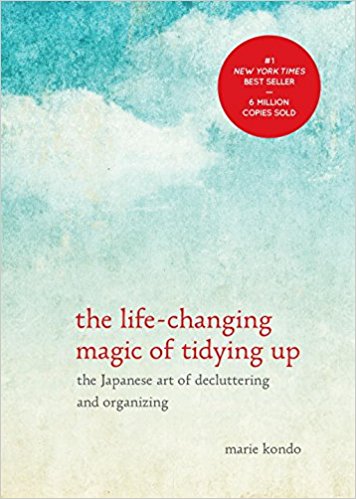 Now folks, this is a somewhat weird book. I highly recommend it or I wouldn’t include it here, but there’s no question that Ms. Kondo has her own idiosyncratic view of how you should treat your possessions. Being one of her clients must be quite an experience, as she insists that things be done her way or else. (She has a three-month waiting list for her personal consultations, so people don’t seem to mind.) She has two central ideas. The first is the one that’s the most problematic for me: that you must do the tidying up of your surroundings all at once. If you do it gradually, she says, you’ll never finish. In an ideal world she’d probably be right, but most of us can’t really take a whole weekend to throw out stuff. If we have to do it that way, we’ll never do it at all.
Now folks, this is a somewhat weird book. I highly recommend it or I wouldn’t include it here, but there’s no question that Ms. Kondo has her own idiosyncratic view of how you should treat your possessions. Being one of her clients must be quite an experience, as she insists that things be done her way or else. (She has a three-month waiting list for her personal consultations, so people don’t seem to mind.) She has two central ideas. The first is the one that’s the most problematic for me: that you must do the tidying up of your surroundings all at once. If you do it gradually, she says, you’ll never finish. In an ideal world she’d probably be right, but most of us can’t really take a whole weekend to throw out stuff. If we have to do it that way, we’ll never do it at all.
Her second idea, though, is very good: focus on what you want to keep, not on what you need to throw out. The way she puts it is that you should get rid of anything that does not give you joy. (Only in rich developed countries would this advice be given.) I just did a further going-over of my closet this morning and I found that using that advice made it very easy for me to see what I still needed to discard. It may seem totally strange to think of asking yourself, “Does this give me joy?” as you hold up a t-shirt, but it really does work. And she’s especially good in her advice about how we should view books and papers. As I have often said, it’s not illegal to throw out books. Here’s what she says: “Books are essentially paper–sheets of paper printed with letters and bound together. Their true purpose is to be read, to convey the information to their readers. It’s the information they contain that has meaning. There is no meaning to their just being on your shelves.” I’m going to rein myself in and not quote the rest of the paragraph. If there’s one type of possession we still need to weed out in this fairly-uncluttered house, it’s books. But she also makes the point that you really can’t throw out someone else’s stuff. So I’m back to the project that I sort of abandoned: going through the books that truly belong to me and getting rid of the ones I don’t want. Am I going to keep my complete set of Dickens? Yes. It makes me happy to see those books on the shelves, and I do re-read some of them once in awhile. Am I going to keep my British history books? No. I will never re-read (or, in some cases, read) them. I don’t need them. Jim has the Simons gene that makes him revere books, and we still have some of his college textbooks in spite of my rather ungracious comments about them. So I need to just leave them (and him) alone and take care of my own stuff. He’s put up with a lot of messiness from me over the years.
At some point I hope to post “before and after” pictures of my new office. Right now it’s a mess, but with the help of this book and my own desire for order I hope to have something beautiful and orderly soon. My mental attitude is so different when I’m working in a clear space!